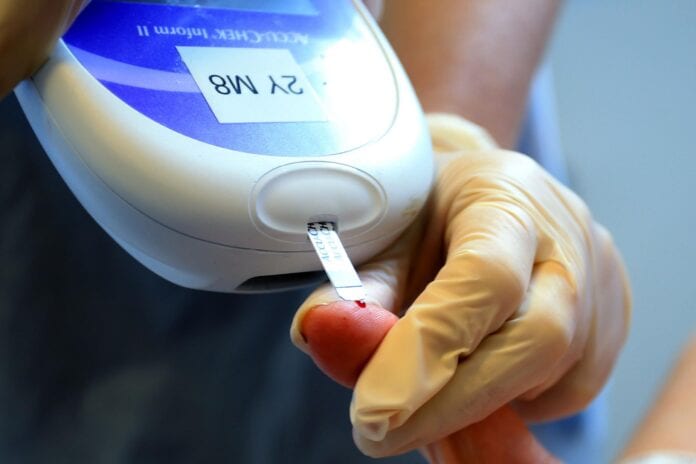- Around 203,499 adults in Wales have been diagnosed with diabetes, up from 198,883 in 2019.
- 7.7% of the adult population is now living with a diabetes diagnosis, the highest prevalence of all UK nations. (see figures for each Health Board below)
- Diabetes UK estimates that a further 65,501 people in Wales are living with undiagnosed type 2 diabetes.
- The number of people living with diabetes hits all time high to reach over 4.9 million in the UK
- This Type 2 Diabetes Prevention Week, Diabetes UK is urgently encouraging people to complete the free online Know Your Risk Tool
New analysis from Diabetes UK shows that over 4.1 million adults are currently living with a diabetes diagnosis in the UK, with 203,499 adults in Wales living with the condition, 90 per cent of those with type 2.
In addition, the charity’s new figures suggest that a further 850,000 living with type 2 diabetes across the UK and an additional 61,488 people in Wales, who are yet to be diagnosed.
Data from the National Diabetes Audit in 2020 suggests that including those under 17, the figure is even higher with 209,015 people with a type 1 or type 2 diabetes diagnosis.
Cases of type 2 diabetes diagnoses have doubled in the last 15 years. But research has consistently shown that for some people, combined lifestyle interventions – including diet, physical activity and sustained weight loss – can be effective in reducing the risk of type 2 diabetes by about 50%.
The new data shows a stark increase in the number of people living with a diabetes diagnosis. Across the UK the charity estimates that there are also more than 13.6 million people at increased risk of type 2 diabetes in the UK. At this rate Diabetes UK predicts the number of people with diabetes, including the undiagnosed population, is expected to rise to 5.5 million by 2030.
NHS Wales estimates that rates will increase to 11.5% of the population by 2030.
Dai Williams, National Director of Diabetes UK Cymru, said: “The number of people with diabetes is increasing year-on-year. As we look to the future post COVID-19, preventing cases of type 2 diabetes must be a public health priority.
“The pandemic has shown with devastating clarity how diabetes puts you at increased risk of poorer outcomes when contracting the virus. Yet, we know that with the right support, up to half of type 2 diabetes cases − and the accompanying risk of developing life threatening complications − can be delayed or prevented.
“This Diabetes Prevention Week, we want to help people understand their personal risk of type 2 diabetes and the first step is to complete our free Know Your Risk Tool, today.
“By taking just five minutes out of your day, you have the power to access information and support that could change your health for the better.”
Type 2 diabetes is a complex condition with multiple risk factors. There are things outside an individual’s control that contribute to their risk, such as age, family history and ethnicity. People of African-Caribbean, Black African or South Asian descent are two to four times more likely to develop type 2 diabetes than those from a White background.
However, our society, and our environment, both also outside the control of the individual, can also impact on the risk of developing type 2 diabetes. In a society that makes it more difficult to lead healthy lives, it is more likely that more people will be living with overweight or obesity.
Research shows that living with obesity is the single greatest risk factor, and accounts for 80-85% of someone’s risk of developing the condition, and previous data suggests that the number of people living with obesity in Wales is the highest in the UK, with 61% of adults being either overweight or obese.
But by understanding their own personal risk, it is possible for people to access support to help them take steps to reduce their risk. Diabetes UK is therefore encouraging everyone to complete Diabetes UK’s free online Know Your Risk tool, today.
The pandemic has and continues to have, a huge impact on society. But research and data have shown that people with diabetes have been disproportionately affected by COVID-19, particularly in terms of poorer outcomes when contracting the virus. That’s why preventing or delaying cases of type 2 diabetes is more important than ever before
Find out more about the risk factors of type 2 diabetes and what you can do to reduce your risk here
Help keep news FREE for our readers
Supporting your local community newspaper/online news outlet is crucial now more than ever. If you believe in independent journalism, then consider making a valuable contribution by making a one-time or monthly donation. We operate in rural areas where providing unbiased news can be challenging. Read More About Supporting The West Wales Chronicle

























